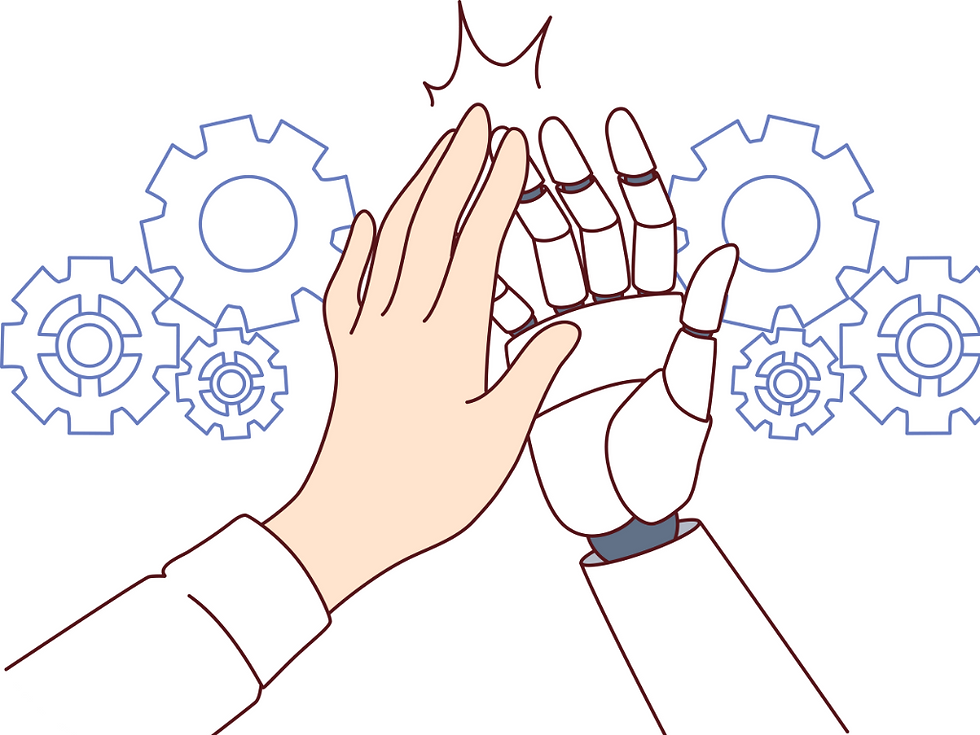Optimizing the Nutrition Workforce with AI: A Glimpse into the Future of Dietetics
- By Dr. Tatyana El-Kour

- May 30, 2025
- 2 min read

It started with a simple question: Can AI help us meet the growing demand for nutritional care when our workforce is stretched thin? With chronic disease rates rising, aging populations increasing, and global shortages of trained nutrition professionals, the strain on our field is undeniable. In this new era, AI doesn’t threaten to replace us—it offers to work with us. In my recent scoping review, Optimizing Nutrition and Dietetics Workforce Capacity with AI Innovations, I explored how industries like finance, healthcare, education, and business have successfully used AI to train, scale, and support their workforces—and what that could mean for us in nutrition and dietetics.
What We Found
Using the PRISMA-ScR framework and AI tools like ChatGPT for thematic analysis, our review examined over a dozen databases and identified five keyways AI can strengthen our workforce:
AI-Enhanced Training
Adaptive learning platforms and virtual simulations—common in finance and healthcare—can personalize ongoing education for dietitians and technicians.
Workflow Optimization
Automating administrative tasks and dietary assessments can give nutrition professionals more time for patient care and less for paperwork.
Predictive Workforce Planning
Borrowed from HR analytics in business, AI can help us forecast staffing needs and design smarter workforce strategies.
AI-Assisted Service Delivery
Chatbots, telehealth models, and virtual nutrition assistants can increase access to care, especially in underserved areas.
Ethical Considerations
We must confront issues of algorithmic bias, tech access gaps, and responsible implementation. Lessons from healthcare and fintech stress the need for transparent, equitable AI use.
A Connected System
Imagine AI at the center of a dynamic web—training, operations, planning, and service delivery all radiating outward, interconnected and evolving. That’s the model we propose not a linear tool, but a system-wide partner in building capacity.
Why This Matters
As AI continues to transform other fields, nutrition and dietetics can—and must—adapt. But we need more than enthusiasm. We need policy frameworks, scalable training systems, and a commitment to equity and ethical integration.
Acknowledgements
This work would not have been possible without the support of Isra Oran, BS, and the use of AI tools such as Elicit and ChatGPT-4.0 for literature synthesis and analysis.
Citations:
Jeanty, P. W., Narcisse, M. R., & Crastes Dit Sourd, R. (2025). Artificial intelligence, machine learning, and data-mining techniques to increase cost-effectiveness in healthcare. Frontiers in Public Health, 12, 1525628. https://doi.org/10.3389/fpubh.2024.1525628
Munira, M. S. K., Juthi, S., & Begum, A. (2025). Artificial Intelligence in Financial Customer Relationship Management: A Systematic Review of AI-Driven Strategies in Banking and Fintech. American Journal of Advanced Technology and Engineering Solutions, 1(01), 20-40. https://orcid.org/0009-0006-4739-1717
This work was presented as an oral research poster at the International Academy of Nutrition and Dietetics Virtual Conference 2025 and was recognized with second-place honors.



Comments